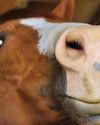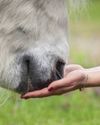Understanding 5 essential minerals for horses

As horse owners, we often rely on feed companies to make sure our horses’ nutritional intake is as balanced as possible. Although many commercial feeds provide a good source of nutrition from their composition, it is important to note the minerals necessary in a horse’s diet. Often behavioural and performance issues are the result of a mineral imbalance in the diet. It’s always best to have a professional equine nutritionist assess your horse’s diet in detail should you suspect an imbalance or a conditioning issue. However, it is in the owner’s best interest to be aware of the basic requirements. We take a look at a few of the most common minerals that should be present in a horse’s diet.
Calcium and phosphorus
Maintaining the correct calcium and phosphorus ratio is very important in a horse’s diet. Horses with calcium or phosphorus deficiency can be prone to a variety of disorders. Calcium assists with normal brain and nerve function, as well as heart, skeletal muscle and intestinal contraction. Phosphorus assists in regulating muscle and heart contraction, cell integrity and the use of glucose in the body.
The calcium to phosphorus ratio is balanced when the diet consists of 0.15 to 1.5% calcium and 0.15 to 0.6% phosphorus. Any ratio less than 1:1 can have adverse effects on the horse. A simple rule to remember is a horse requires as much calcium as phosphorus in his diet – and never the other way around.
This story is from the November 2017 edition of HQ magazine.
Start your 7-day Magzter GOLD free trial to access thousands of curated premium stories, and 9,000+ magazines and newspapers.
Already a subscriber ? Sign In
This story is from the November 2017 edition of HQ magazine.
Start your 7-day Magzter GOLD free trial to access thousands of curated premium stories, and 9,000+ magazines and newspapers.
Already a subscriber? Sign In

The Science Behind Tapering
The science behind tapering

Horse Treats
The ultimate guide

Horsey Hair Care
Tips and tricks for a healthy mane and tail

Horsey Hydration- The Importance Of Water In Winter
The importance of water in winter

A Horseback Safari
Abelana Game Reserve

The Psychology Of Riding Performance
Intrinsic motivation, part 7

10 Best Life Lessons From Horses
Life lessons from our horses

Breaking New Ground
The evolution of the Callaho Online Auction

Horse Psychology 101
Part 3: The horse's cognitive abilities

Colic Part 1
An owner’s worst nightmare